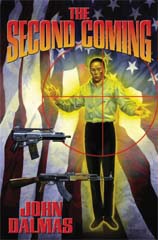
The apartment was small, its furnishings expensive and conservative. As usual, its occupant ate alone—a TV supper in a plastic tray. Meat, mashed potatoes, mixed vegetables and a brownie, the portions meager for so tall a man, and there weren't even salt and pepper shakers on the table. His appearance had been likened to Lincoln's, before Lincoln grew the beard, but the resemblance was strictly skeletal. His mouth was nearly lipless, his hair disciplined and straight. Creases bracketed his mouth from nose to chin, curving sourly at the bottom, reflecting the absence of humor.
Just now he was eating to television, to the Authors Channel, waiting for a scheduled interview. An unauthorized biography of General Rodney Beauchamp had been published. Beauchamp had reoriented and reorganized the army for twenty first century needs, then been forced to retire for publicly criticizing foreign policy. The diner knew the general, and approved of him.
Meanwhile the coverage was for a book on someone of whom the diner did not approve at all. While he watched, his fork transferred small bites of food to his mouth. He chewed them thoroughly, as he'd been taught when a child.
On the screen, two men sat half facing each other, half facing the camera. "I've read a number of Ngunda Aran's columns," the host said, "and heard him lecture on TV. I find his viewpoints interesting."
"Actually," the author said, "I find them interesting too, but you need to consider them in context. Before Ngunda the writer and lecturer, there was Ngunda the philanthropist, whose good works brought him broad notoriety. Now he uses that base, that foundation of respect, as a public platform from which to expound his beliefs—if that's what they actually are."
The host interrupted. "But most columnists expound on their beliefs. And he hasn't proposed crimes, hasn't recommended civil disobedience, hasn't even been discourteous. What, exactly, is your complaint with him?"
"First let me point out that the bonds holding society together are stretched thin today, and fraying. And the ideas he expounds are foreign to the American social psyche. They add seriously to the strain. People admire him or they hate him, and polarization is something we don't need more of.
"Meanwhile, his Millennium Foundation has become a public relations organization for his self-image and metaphysical philosophy . . ."
The tall man pressed the mute switch. Idiot, he thought grimacing. He's got something worthwhile to say, and dresses it in liberal-humanist babble. His fork pierced a cut bean, some peas, and a fragment of diced carrot, raising them to his thin lips as the two men mouthed soundlessly on the screen. Ngunda Aran. Again he grimaced. Satan smiling, garbed in good works.
He would, he decided, explore some possibilities.